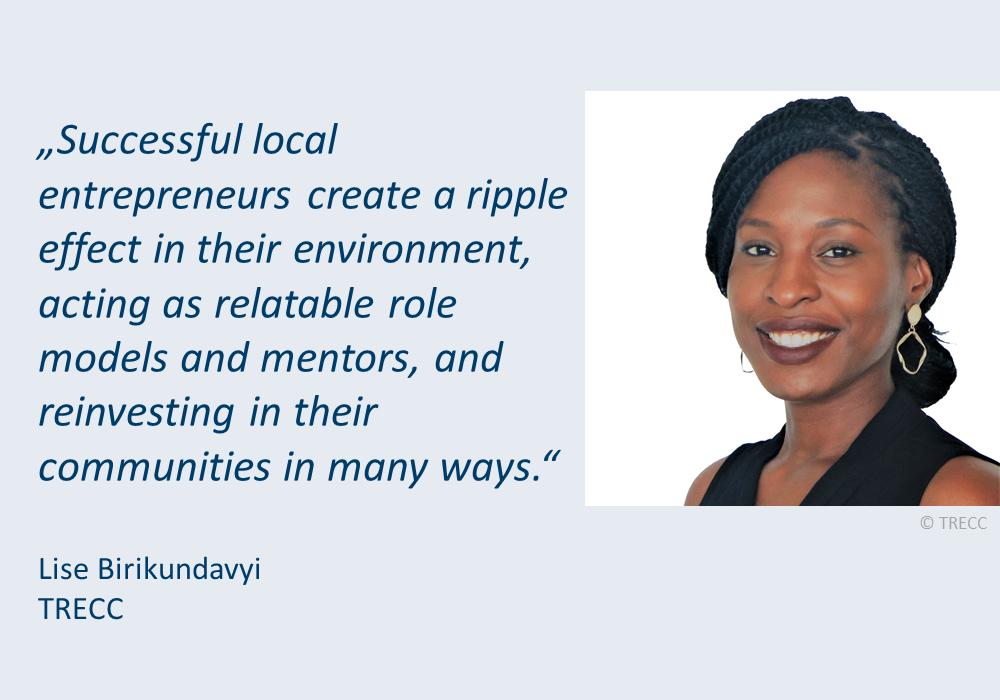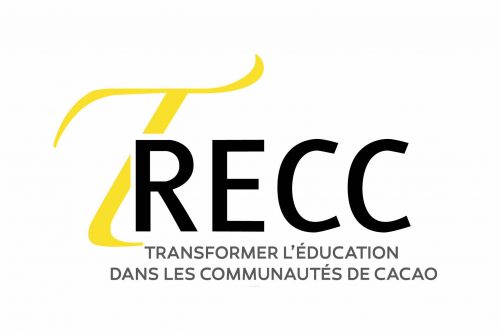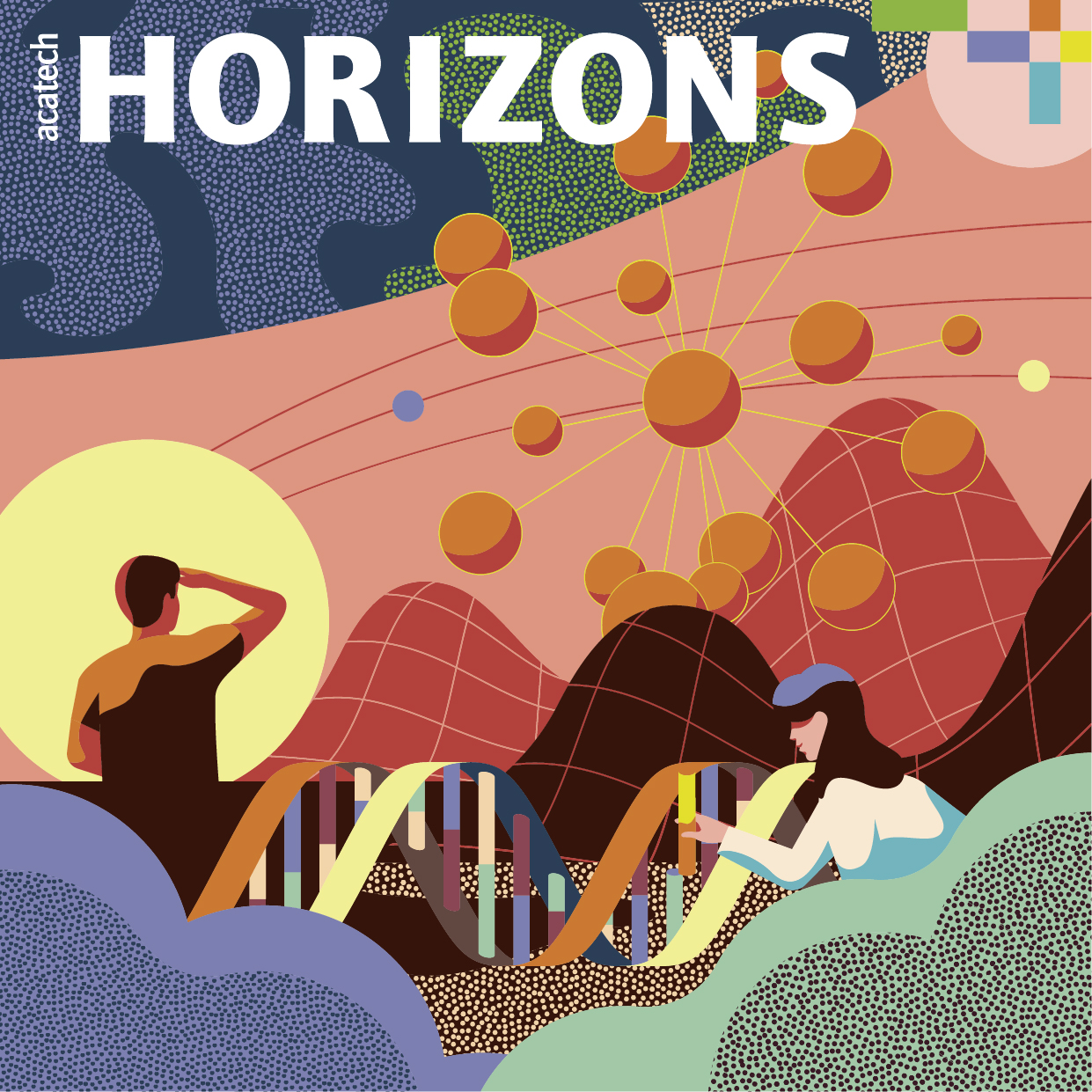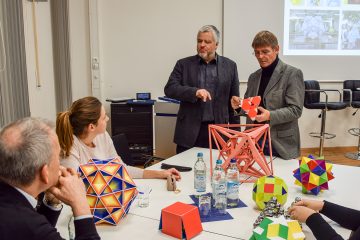Sustainability Practices in the Cocoa Industry – A Guest Contribution by Lise Birikundavyi

13 January 2020
While problems are surely different, sustainability is not something only Germany thinks of. Sustainability is also at the forefront of every cocoa and chocolate company’s mind working in Côte d’Ivoire. There are real concerns about the treatment of the land, deforestation and quality/availability of labour. These are all variables not only potentially greatly affecting the future of the commodity, but with serious economic, social and ecological implications for the cocoa-growing regions. TRECC, an initiative led by the Jacobs Foundation, the Ivorian government and the chocolate industry, see the vast potential impact that access to quality education can have in addressing the root cause of a key set of issues.
Lise Birikundavyi, TRECC Deputy Country Director, tells us about their work, where the ethical mandate is to provide equitable access to education for children. Beyond that (and with that), the goal is to increase literacy rates and good education among farmers, then effectively applying good agricultural practices. This can help in optimizing farmers’ revenues, providing a solution against the economic rational behind deforestation and bad treatment of the land. More revenues and optimised operations also mean that there is less need for unqualified labour (which to date can include out of school youth) and that there is more money to cover the costs associated to sending children to school.
TRECC supports social enterprises and education technology companies, which can help in endeavoring these goals.
Quality Education at the Core of Sustainability Practices
How quality education delivery to children and farmers via social enterprises and education technology companies can help the cocoa and chocolate industry strengthen their value chain
When it comes to sustainability, unfortunately there are no shortcuts: it requires long-term investments and patience to achieve expected results. The same way that investing in organic fertilizer (often a synonym of lower short-term output and productivity) is the best solution for the long-term care of the soil and better health outcomes, investing in high quality early childhood education and primary school education in cocoa growing regions is the best path forward to eradicate the persistent development issues experienced in these communities. Investment in early education allows the youth to develop the cognitive and social abilities they need to thrive later in life, effectively reducing illiteracy rates and putting in place the building blocks needed to create a strong base of human capital in these regions.
With the right combination of educated workforce and investment, cocoa farming, a job that is often associated with hardship and poverty, can become a career that is moving forward through innovation and technology – allowing workers to do more with less. Education provides the basis for empowerment and the opportunity for a generation to believe in themselves while achieving more than they could dream of without having to consider moving to the cities.
Investing in local social entrepreneurs to provide self-sustaining education solutions
To catalyse change and strengthen the education system in Côte d’Ivoire, TRECC aims to inform and empower an ecosystem of stakeholders based on previous evidence. This ecosystem includes the Ivorian government, the cocoa and chocolate industry, academia, funders, civil society and social entrepreneurs. Contextualised education solutions are at the core of the TRECC initiative and they are, among others, explored through an impact finance portfolio. With this portfolio, promising entrepreneurs in education are empowered. The final objective is turning them into local champions and leveraging the social impact in their communities.
The choice of using impact finance instruments was driven by the desire to promote the creation of entrepreneurial, self-sustaining solutions to local problems. Grant-based financing faces the risk of lacking sustained impact beyond the grant cycle. However, interventions that are either embraced by public structures or that are self-sustainable financially have a greater likelihood of scaling and lasting beyond the initial grant funding. Impact investment or impact finance can be defined as using venture capital tools for the creation of social goods. An impact investor – as TRECC for example is – will invest in companies (often young ventures) with a business model that involves products and services solving an important social issue – in our case providing scalable education solutions improving access to quality education in an affordable way. The local businesses eventually provide a sustainable solution to the targeted issue. Additionally, the local entrepreneurs create a ripple effect in their environment, acting as relatable role models and mentors, and reinvesting in their communities in many ways.
TRECC directly and indirectly invested in 12 young companies that have the potential to create systemic change in the education space in Côte d’Ivoire. Through these investments, TRECC is supporting the actions of the cocoa and chocolate industry and the Ivorian government aiming to improve livelihood in rural areas, eventually leading to greater sustainable practices in the sector. More than half of the portfolio companies are tech focused.
Case Studies: The early impact of smart partnerships between the industry and social entrepreneurs
Although the TRECC impact finance portfolio is still in its early stages, the impact of education technology on the cocoa and chocolate industry can already been identified. Here are a few examples of the investees’ innovative solutions to education challenges in cocoa communities:
1. Eneza Education: Virtual tutoring via SMS for primary and secondary school students
In an environment where many children attend overpopulated classes and do not have access to the required textbooks, Eneza Education provides access to a digitalised curriculum, approved by the Ministry of Education, through short message services (SMS). The national content, covering the primary and secondary school program, has been adapted to fit small screens, be digestible and evolve at the pace of each student. Acting as a virtual tutor, this technology can be used across devices and even includes access to live teachers for more complex questions or for socioemotional concerns. Eneza is currently working with Nestle to support about 500 primary and secondary students at risk of child labour in cocoa communities. By providing them with access to additional pedagogical material that has been adapted to their context, Eneza also provides them with the increased opportunity to succeed in school and a greater control of their future.
2. Advans Microfinance: Digital loans for education
Through a market study conducted to understand why it is difficult for cocoa farmers to save enough money for school fees and related expenses, the Advans team found out that the majority of school-related payments are due right before harvest, at a moment where most farmers are cash-strapped. With an average of 4 children per family, many cocoa farmers admit struggling to save enough from their last influx of revenue to cover all the back-to-school expenses. This leads to 40% of farmers sending their children to school one to two months late, as they have to wait for the revenues from the new harvest. This creates a situation where learning becomes challenging for their children.
The results of this market study have prompted Advans to create the first digital school loan program in Côte d’Ivoire. Advans Côte d’Ivoire is a microfinance institution (MFI) already known for its innovative and accessible banking services. Its client base includes slightly over 17,000 farmers. Using cooperative membership activities and farmers’ savings history with Advans, the MFI can assess credit risk and offer a product with a repayment schedule aligned with the seasonality of the farmers’ income. In 2018, Advans partnered with the cocoa and chocolate industry to access farmers in their cooperatives. About 1,120 farmers were able to take advantage of this new loan product to send their children to school on time. Through this innovative financial service and through its existing loan offering for low cost private schools in rural areas, Advans contributes to solving the challenge of access to quality education in rural Côte d’Ivoire. The Jacobs Foundation, to which TRECC belongs, has indirectly invested in Advans through the Regional Education Finance Fund for Africa.
3. Chalkboard Education: Offline training platform for rural dwellers, community workers and students
While focusing on early education is vital, it is also important to support farmers and community workers with dedicated skill trainings. Unfortunately, the farmers and workers are often based in remote locations, making their education both costly and difficult. The high market penetration of feature phones and basic smart phones however has changed the outlook on the situation. Taking advantage of this opportunity, Chalkboard Education has built a unique digital platform that makes mobile learning for adults easy, efficient and accessible – providing options such as lite imagery and vocal content for illiterate end users. The social enterprise deploys its customized platform for universities and NGOs. This allows various learning communities to have access to offline content and to give their clients the means to improve curricula and program outcomes, using the extensive data analytics provided by their product. In Côte d’Ivoire, Chalkboard is working with the International Cocoa Initiative (ICI) to educate its staff and partners on sensitive topics, such as child safeguarding and child labour prevention. These are important elements in supporting the industry’s efforts against child labour and promoting youth education.
The way forward for sustainability strategies
The above are only a few examples showcasing the potential of tech start-ups and social entrepreneurs to contribute to the sustainability agenda of the food and beverage companies all around the world. There are additional social enterprises directly working on agricultural issues, whose work is worth highlighting, including Farmerline in Ghana and Greenpath in Ethiopia.
Despite the recent global wave of social entrepreneurship and their major role in solving societal issues with meaningful, measurable and lasting change as a result, these entrepreneurs cannot grow and deliver impact alone. These structures most often require an ecosystem of investors, advisors, partners and talent pools to thrive. The role of patient capital (i.e. investors willing to wait between 8-10 years before seeing a financial return on investment) in supporting social entrepreneurs in an environment like Côte d’Ivoire is critical – these businesses need investors who understand the complexity of the problems and are committed to accompany them through the sometimes long and difficult journey that will lay the foundations for long term impact. Where traditional investment is not possible, there will always be other important roles traditional corporations can take (e.g. as clients, partners, advisors, etc.), to build an ecosystem for these change makers to thrive and to contribute efficiently to their sustainability strategy.
About TRECC

The initiative called Transforming Education in Cocoa Communities (TRECC) strives to enable children and youth to lead healthy and fulfilling lives, respond to local and global challenges, pursue their dreams, and reach their full potential through access to quality education.
Over the last three years, the Ivorian government, 12 cocoa and chocolate companies, 20 civil society organizations and academic partners, and two foundations have joined this effort. Impact finance is one of the strategic engagement pillars of the TRECC initiative, seeking to create a hub for education enterprises providing affordable market-based solutions in Côte d’Ivoire.
TRECC was founded in 2015, when the Jacobs Foundation committed to lead a comprehensive strategy to improve quality of education and support early childhood development in the cocoa-growing communities of Côte d’Ivoire. This came in response to the Government of Côte d’Ivoire defining quality education as a key priority and the Chocolate Industry, recognising that education was a key solution to reducing child labour and to countering low agricultural productivity. These pose a serious threat to the industry’s sustainability. The Jacobs Foundation’s expertise in basic education as well as its mission to promote evidence-based approaches were particularly relevant to the goal of efficiently addressing the roots of the problem.
About the Jacobs Foundation
The Jacobs Foundation is active worldwide in promoting child and
youth development. It was founded in Zurich by  entrepreneur Klaus J. Jacobs in 1989. The Jacobs Foundation allocates a budget of some 40 million Swiss francs per year to fund research projects, intervention programs and scientific institutions. It is committed to scientific excellence and evidence-based research.
entrepreneur Klaus J. Jacobs in 1989. The Jacobs Foundation allocates a budget of some 40 million Swiss francs per year to fund research projects, intervention programs and scientific institutions. It is committed to scientific excellence and evidence-based research.

Lise Birikundavyi is the deputy country director and impact finance investment manager for the TRECC program in Côte d’Ivoire. In this role, she is in charge of identifying and driving value from investments in education and education technology companies that can improve the quality of education in Côte d’Ivoire. Lise has 10 years of experience in the financial sector and across the investment spectrum, from funds of funds and VCs, to being the transition CEO of a tech start-up. She is a firm believer in market driven initiatives as sustainable poverty alleviating solutions.
The contributions in the HORIZONTE logbuch reflect the opinions and expert assessments of their authors and not positions of acatech – National Academy of Science and Engineering.
To the HORIZONTE logbuch main page (German)




